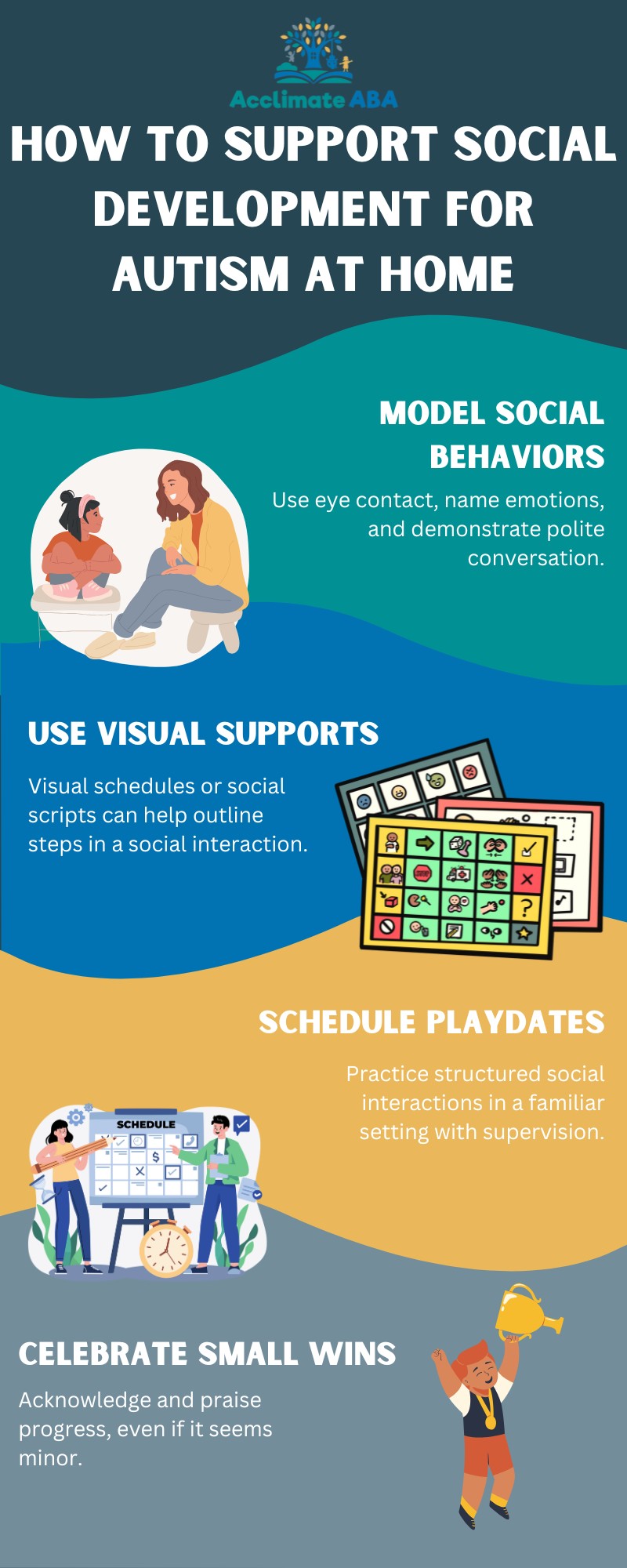Key Points:
- Autism social issues often involve difficulty interpreting social cues and initiating or sustaining interactions.
- Social skill deficits vary widely between individuals and can be improved through structured interventions.
- ABA therapy provides evidence-based strategies to build communication, social awareness, and interactional confidence.
Social communication challenges are one of the most common and impactful features of autism. These difficulties often include trouble reading facial expressions, understanding social cues, or knowing how to start or maintain a conversation.
In this article, we’ll explore how autism affects social skills, why these challenges occur, and how targeted therapies and home-based strategies can help. From structured interventions like ABA therapy to everyday routines, there are many ways to support social growth and connection.
What Are Social Issues in Autism?
Social issues in autism involve difficulty understanding, interpreting, and engaging in typical social interactions. These challenges may be rooted in differences in communication style, sensory processing, and the way autistic individuals perceive social information.
While not everyone on the spectrum will struggle in the same way, common difficulties include reading facial expressions, maintaining back-and-forth conversations, and understanding social rules or norms. These issues can lead to social isolation, misunderstandings, and anxiety in group settings.
Social communication deficits are one of the defining features of autism spectrum disorder (ASD), and they often require targeted support to improve.
How Do Social Challenges Manifest in Autism?
Social difficulties in autism can take many forms and are influenced by a child’s developmental level, language ability, and sensory sensitivities. These challenges are not due to a lack of interest in others but rather difficulty understanding how to interact in expected ways.
Some common manifestations of autism-related social issues include:
1. Reduced Eye Contact and Expression
Many autistic individuals avoid or limit eye contact and facial expressions, which may be misread as disinterest, though it often reflects sensory sensitivity or difficulty interpreting nonverbal cues.
2. Trouble with Conversation Turn-Taking
Challenges with conversational flow—such as interrupting or not responding—stem from difficulty reading social timing rather than intentional rudeness or lack of interest in dialogue.
3. Difficulty Making or Keeping Friends
Initiating, maintaining, or deepening peer relationships can be hard due to misunderstanding social norms or anxiety in unpredictable social settings.
4. Literal Understanding of Language
Autistic individuals may interpret language literally, making it hard to understand jokes, sarcasm, or figurative speech.
5. Atypical Speech Patterns
Speech may sound flat, monotone, or overly formal due to differences in expressive communication or motor planning for tone and rhythm.
6. Unawareness of Personal Space
Struggles with reading body language and spatial awareness can lead to standing too close or missing physical social cues.
7. Challenges Reading Emotional Cues
Autistic children may not recognize others’ emotions easily, leading to unintentional misunderstandings or missed opportunities for connection.
These behaviors may be misinterpreted as rudeness or disinterest, but they are often signs of neurological differences in processing social information.
Why Do People with Autism Struggle with Social Skills?
Autism affects how the brain processes information, including social stimuli. Children on the spectrum often have differences in executive functioning, sensory integration, and theory of mind (the ability to understand other people’s thoughts and feelings). These differences make it harder to follow the unspoken rules of social interaction.
For example, theory of mind delays can make it difficult to understand that others have different perspectives. Sensory sensitivities can make noisy or crowded environments overwhelming, making social situations more stressful.
Social learning often happens incidentally in neurotypical development—children observe, imitate, and practice. But children with autism may require direct teaching, visual supports, and plenty of practice to develop those same skills.
What Are Effective Social Skills Interventions for Autism?
Interventions for social skill development need to be individualized and evidence-based. Structured, consistent support allows children with autism to build meaningful, lasting skills that translate into everyday life.
Some of the most effective approaches include:
1. Applied Behavior Analysis (ABA)
ABA uses positive reinforcement and structured teaching to break social skills into manageable steps, promoting consistent progress across different settings like home, school, and therapy sessions.
2. Social Stories
Social stories explain social situations and expected behaviors, helping children prepare for new or challenging interactions using clear, concrete language and visuals.
3. Video Modeling
Children watch videos demonstrating positive social interactions. Visual repetition supports learning, helping children imitate and internalize appropriate social behaviors in real-life situations.
4. Peer-Mediated Interventions
Typically developing peers are coached to model and reinforce social behaviors, creating natural, inclusive opportunities for social learning during everyday activities.
5. Group Therapy or Social Skills Classes
Small, therapist-led groups allow children to practice key social skills—like conversation, cooperation, and emotion recognition—while receiving guided feedback and support from both adults and peers.
What Role Does ABA Therapy Play in Social Development?
ABA therapy is a research-backed approach that helps children learn and maintain new behaviors, including those related to communication and social interaction. Therapists use assessment data to build individualized goals and track progress over time.
Because ABA is highly structured and focused on measurable outcomes, it is often effective in helping children generalize social skills across environments—home, school, and the community.
How Can Parents Support Social Development at Home?
Parents play a key role in reinforcing and generalizing social skills taught in therapy. Creating natural opportunities for interaction and providing consistent feedback at home is essential. Below are ways parents can help:

Consistency and repetition are key. What may seem like a basic interaction for one child may take many attempts and much support for another.
Can Social Challenges Improve Over Time?
With the right support and consistent practice, many children with autism make significant gains in social understanding and interaction. Progress may look different from one child to another, but growth is possible at any age.
Intervention works best when it is started early and involves both structured teaching and naturalistic learning. Generalization—the ability to use a skill across different situations and people—is a key indicator of real-world success.
Ongoing support, patience, and collaboration among parents, teachers, and therapists are crucial in this journey.
What Social Skills Should Be Prioritized First?
While each child is different, certain foundational skills tend to have the greatest impact when addressed early. Building a solid base makes it easier to expand into more complex interactions over time.
Here are foundational social skills worth prioritizing:
1. Joint Attention
Joint attention involves sharing focus on a person, object, or event. It supports early social connection, learning through interaction, and is foundational for developing communication, play, and understanding others’ perspectives.
2. Imitation
Imitation helps children learn by copying actions, sounds, or facial expressions. This skill builds language, social routines, and interactive play by encouraging observation and participation in shared activities with peers or adults.
3. Initiating and Responding to Greetings
Greeting others teaches children how to start and maintain social interactions. Practicing this skill builds confidence, fosters social inclusion, and helps children feel more comfortable in everyday social settings.
4. Understanding Emotions
Recognizing and labeling emotions allows children to connect feelings with behaviors. This skill helps build empathy, navigate social situations, and develop meaningful relationships by responding appropriately to their own and others’ emotions.
5. Reciprocal Conversation
This skill involves turn-taking, staying on topic, and showing interest in others during dialogue. It supports peer bonding, communication growth, and long-term success in both academic and community social environments.
These skills provide a foundation for more advanced goals such as building friendships, resolving conflict, or working in a group.
Create Steady Progress With ABA Therapy
Navigating autism social issues can feel overwhelming, but you don’t have to do it alone. Acclimate ABA provides compassionate, evidence-based ABA therapy in Utah that focuses on social skills, communication, and independence.
Our team creates personalized programs that help children develop the confidence and ability to connect with others. Whether your child is working on eye contact, conversation skills, or emotional understanding, our therapists are here to guide you every step of the way.
Get in touch with us to learn how ABA therapy can support your child’s social development in meaningful, measurable ways.



